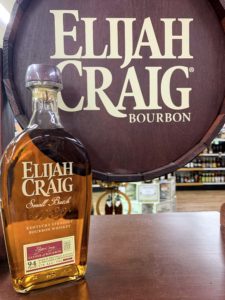Elijah
Preaching the gospel of bourbon in the 1700s
By RL Reeves Jr
How old-school was Elijah Craig? The legendary whiskey-distilling preacher had his first brush with the law on July 28th, 1768. His crime? Vagrancy, and preaching without a license.
His ministry took place in a Virginia tobacco barn.
Some 15 years later the new lands of the Kentucky region would beckon and the whiskey-loving preacher migrated west where he purchased a thousand acres of land, and laid out what would first become Lebanon, and then the city of Georgetown.
In the fall of 1781, Elijah Craig left Spotsylvania County, Virginia for Kentucky, bringing some 500 of his parishioners along with him. It is said that he conducted daily sermons from the books of Genesis and Exodus as the flock made their way through the wilds of Appalachia.
Once the congregation got settled in, Elijah busied himself establishing Royal Springs Academy, the first classical school in the state. Upon its failure Craig dusted himself off, and built the Rittenhouse Academy, a land grant school for the community.
Today Georgetown College occupies the site of Rittenhouse, and campus legend has it that a barrel of Mr. Craig’s whiskey is secreted away in the columns of the school’s Giddings Hall.
No dilettante, Elijah Craig kept many irons in the fire. When he wasn’t busy preaching to his parishioners, he contented himself with becoming one of Kentucky’s leading industrialists. He built and developed a lumber yard, and saw mill, a fulling mill, and a grist mill.
He is also credited with creating Kentucky’s first paper mill.
Oh, and he began distilling bourbon. A lot of bourbon. Craig paid $140 in federal excise taxes in 1798. Bear in mind that a dollar in that era would now be roughly equivalent to $21.
But is Elijah Craig “the father of bourbon?” After all, the happy accident of ageing whiskey in charred white oak barrels is credited to the thrifty Craig.
Following a fire at his distillery, Elijah, not wanting to waste the good barrels just because they had a little heat and smoke damage, filled them with whiskey, and shipped them to New Orleans. The veteran drinkers of the Crescent City sent word back that this new batch was his best yet. And a new tradition was born.
The Elijah Craig marque was first registered in 1960 by Commonwealth Distillers of Deatsville, Kentucky. Newspaper ads of the day found branded bottles selling for under $5.
Today, all Elijah Craig bourbons are made at Heaven Hill in Bardstown (the largest family-owned distillery in the US.) Why do whiskey aficionados seek out the brand? Elijah Craig’s mash bill is higher in corn ratio, at about 78 percent corn and 10 to 12 percent rye and malted barley.
On May 13, 1808, Craig was “in a low state of health but of sound mind and memory,” and penned his last will and testament. He died on May 18, 1808. The Kentucky Gazette wrote the following eulogy: “He possessed an extremely active mind and his whole property was expended in attempts to carry his plans to execution—he consequently died poor. If virtue consists in being useful to our fellow citizens, perhaps there were few more virtuous men than Mr. Craig.”
This eulogy stood as a harsh rebuke to Craig’s religious contemporaries who said at the time he “allowed Satan to take advantage of the weakness of the flesh”
Historic sources include:
A History of Kentucky Baptists From 1769 to 1885 by JH Spencer
The Social History of Bourbon: An Unhurried Account of Our Star-Spangled American Drink by John Taylor
Frontier America by Thomas D Clark
History of Kentucky by Richard H. Collins
__
This article also appears on page 16 of the September 2020 print edition of Ace Weekly.
Subscribe to the Ace e-dition for Lexington news, arts, culture, food, and entertainment news delivered to your inbox.
Call today toadvertise in Ace, 859.225.4889







